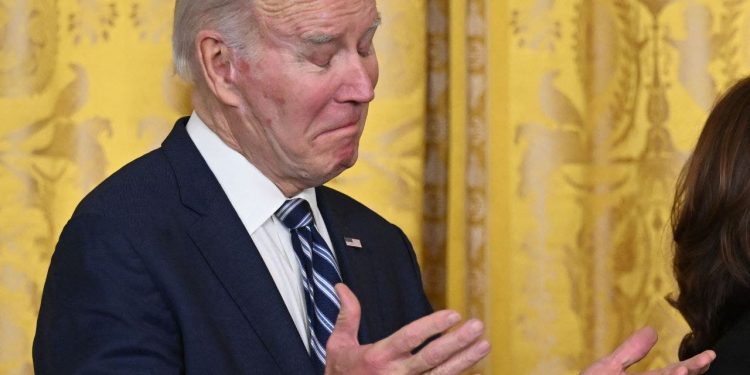
The House voted Tuesday to kill the Biden administration’s controversial rule that encourages private retirement plan fiduciaries to consider environment, social and governance (ESG) factors when making investment decisions for tens of millions of Americans.
The Department of Labor rule is widely seen by Republicans as part of the Biden administration’s push to inject ‘woke’ ideology into all aspects of government. Under the rule, fiduciaries who make investment decisions for the retirement plans of more than 150 million people would be explicitly permitted under federal guidelines to consider companies’ approach to climate change and other social issues, instead of focusing on only profitability and return on investment for retirees.
Republicans say that’s a recipe for tanking millions of investment accounts, and on Tuesday, House GOP leaders called up a resolution aimed at killing the rule, which passed 216-204. Only one Democrat voted for it.
Democrats argued during the floor debate that the Labor Department’s rule would free up retirement plan managers to make investments in companies that adhere to ESG standards today and therefore may be more profitable in the long run, even if they are less profitable today.
‘Consideration of ESG factors is not at odds with making a profit,’ said Rep. Bobby Scott, D-Va. ‘But if a company has negative externalities, such as carbon-intensive business practices, vulnerability to sea-level rise, high liability risks or a record of mistreating workers who may go on strike, its stock could suffer in the long term.’
Rep. Mark DeSaulnier, D-Calif., said the Labor Department rule is a ‘a recognition that if a company is inherently risky because of the business they do on their internal practices, its stock could suffer in the long run.’
But several Republicans rejected this analysis and said the rule is a form of pressure from Washington to adopt ESG standards and fall in line with the consensus view of Democrats.
‘The left is using ESG investment criteria as a political tool to cudgel companies into accepting leftist policies,’ said Rep. Virginia Foxx, R-N.C. ‘This is how the left always operates. This is just the first step. If we let this continue, the left will use ESG investing to push non-compliant companies out of the marketplace.’
‘It is unacceptable to encourage fiduciaries to sacrifice the savings of Americans to the orthodoxy of the woke left,’ she added.
‘This is an ideological push on corporations,’ said Rep. Glenn Grothman, R-Wis. ‘This to further push down on them and say, ‘Here you are, Mr. Big Corporation, we’ll give you a nice pat on the back if we use all of your stockholders’ money to promote a political agenda.’’
‘It’s this pound, pound, pound that we already get from the universities, we already get from the popular culture in Hollywood, now we’ve got to get it from big business,’ he said.
Republicans also argued that companies that promote ESG policies generally underperform compared to those that don’t and carry much higher fees. Rep. Andy Barr, R-Ky., who sponsored the resolution, said Democrats are threatening Americans’ retirement funds by ‘plowing them into less diversified, higher fees and lower performing portfolios at precisely the time that we need to maximize financial security for Americans approaching retirement.’
Rep. Bob Good, R-Va., said the rule is only aimed at supporting the ‘phony climate movement,’ and he added that if ESG stocks performed better, ‘They would get those investment dollars anyway without this new rule.’
The resolution was written under the Congressional Review Act, which allows Congress to reject executive branch rulemakings if both the House and Senate pass a resolution disapproving of a rule.
House passage of the disapproval resolution now leaves it to the Senate, where Republican supporters can force a vote on the Senate floor even if Democrats oppose it. If it came to the Senate floor, it could pass if every Republican and Sen. Joe Manchin, D-W.Va., support the effort to kill the ESG rule.
However, Senate passage doesn’t guarantee that the rule will die. The White House said Monday night that President Joe Biden would veto the resolution if it were to reach his desk.
If that happens, the House and Senate would need a two-thirds majority vote to override Biden’s veto, and today’s House vote shows that a two-thirds majority probably can’t be reached given broad support of the Labor Department rule from Democrats.

The House voted Tuesday to kill the Biden administration’s controversial rule that encourages private retirement plan fiduciaries to consider environment, social and governance (ESG) factors when making investment decisions for tens of millions of Americans.
The Department of Labor rule is widely seen by Republicans as part of the Biden administration’s push to inject ‘woke’ ideology into all aspects of government. Under the rule, fiduciaries who make investment decisions for the retirement plans of more than 150 million people would be explicitly permitted under federal guidelines to consider companies’ approach to climate change and other social issues, instead of focusing on only profitability and return on investment for retirees.
Republicans say that’s a recipe for tanking millions of investment accounts, and on Tuesday, House GOP leaders called up a resolution aimed at killing the rule, which passed 216-204. Only one Democrat voted for it.
Democrats argued during the floor debate that the Labor Department’s rule would free up retirement plan managers to make investments in companies that adhere to ESG standards today and therefore may be more profitable in the long run, even if they are less profitable today.
‘Consideration of ESG factors is not at odds with making a profit,’ said Rep. Bobby Scott, D-Va. ‘But if a company has negative externalities, such as carbon-intensive business practices, vulnerability to sea-level rise, high liability risks or a record of mistreating workers who may go on strike, its stock could suffer in the long term.’
Rep. Mark DeSaulnier, D-Calif., said the Labor Department rule is a ‘a recognition that if a company is inherently risky because of the business they do on their internal practices, its stock could suffer in the long run.’
But several Republicans rejected this analysis and said the rule is a form of pressure from Washington to adopt ESG standards and fall in line with the consensus view of Democrats.
‘The left is using ESG investment criteria as a political tool to cudgel companies into accepting leftist policies,’ said Rep. Virginia Foxx, R-N.C. ‘This is how the left always operates. This is just the first step. If we let this continue, the left will use ESG investing to push non-compliant companies out of the marketplace.’
‘It is unacceptable to encourage fiduciaries to sacrifice the savings of Americans to the orthodoxy of the woke left,’ she added.
‘This is an ideological push on corporations,’ said Rep. Glenn Grothman, R-Wis. ‘This to further push down on them and say, ‘Here you are, Mr. Big Corporation, we’ll give you a nice pat on the back if we use all of your stockholders’ money to promote a political agenda.’’
‘It’s this pound, pound, pound that we already get from the universities, we already get from the popular culture in Hollywood, now we’ve got to get it from big business,’ he said.
Republicans also argued that companies that promote ESG policies generally underperform compared to those that don’t and carry much higher fees. Rep. Andy Barr, R-Ky., who sponsored the resolution, said Democrats are threatening Americans’ retirement funds by ‘plowing them into less diversified, higher fees and lower performing portfolios at precisely the time that we need to maximize financial security for Americans approaching retirement.’
Rep. Bob Good, R-Va., said the rule is only aimed at supporting the ‘phony climate movement,’ and he added that if ESG stocks performed better, ‘They would get those investment dollars anyway without this new rule.’
The resolution was written under the Congressional Review Act, which allows Congress to reject executive branch rulemakings if both the House and Senate pass a resolution disapproving of a rule.
House passage of the disapproval resolution now leaves it to the Senate, where Republican supporters can force a vote on the Senate floor even if Democrats oppose it. If it came to the Senate floor, it could pass if every Republican and Sen. Joe Manchin, D-W.Va., support the effort to kill the ESG rule.
However, Senate passage doesn’t guarantee that the rule will die. The White House said Monday night that President Joe Biden would veto the resolution if it were to reach his desk.
If that happens, the House and Senate would need a two-thirds majority vote to override Biden’s veto, and today’s House vote shows that a two-thirds majority probably can’t be reached given broad support of the Labor Department rule from Democrats.
















